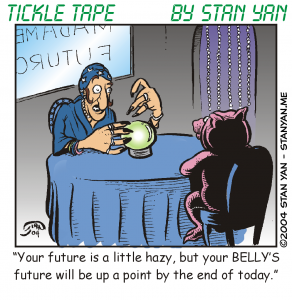To your surprise, you’ve just lost $1,000. Naturally, you feel guilty and angry. You wish it didn’t happen. You try to justify it: “It’s just the tuition you pay to become a master trader. You need to go in expecting to lose. It’s the nature of the game.” As useful as these statements are, though, mulling them over isn’t helping today.
Instead, you can’t stop thinking about the car payment due next week, your son’s birthday party tomorrow, or how you just bought a new car stereo. You think, “$1,000 is a lot of money. I can’t just write it off, consider it a minor setback and move on.” As hard as it is, that’s what you have to do. As a trader, you have to think of the big picture, and hope that if you work hard enough, and make enough trades under the right market conditions, you’ll come out ahead. That said, it isn’t always that easy. The dynamics of risk aversion and loss run deep.
Do you have trouble taking a loss? You are not alone. Large corporations have trouble taking losses too. Behavioural economists have shown that companies go bankrupt rather than admit that their corporate identity and business plan need reworking (Pan Am went under because executives couldn’t admit their hotel business was doing better than the airline). Bankers refuse to write off bad loans because they don’t want to admit to their superiors that they mistakenly lent it to people who were a bad risk. And institutional money managers leave losses on paper because they are afraid to own up. As a short-term trader, the losses you take maybe a fact of life, but that doesn’t make them easy to handle.
Feeling guilty over taking a loss isn’t irrational. Indeed, it’s been adaptive throughout human history. There’s a strong biological urge to protect yourself and your loved ones. For tribes of hunters and gatherers, it meant obtaining food and shelter and protecting those resources from loss. In modern times, it means having enough money to pay for food, clothes, and housing. So when you lose money, even as a professional, active trader, it hurts a little when you think of the resources the money can purchase.
It’s adaptive to think in these terms. It was part of your upbringing. Your parents and teachers taught you to protect yourself and your family, and to do that, you needed to make money and save it. When you lose money on a trade, you naturally start to feel guilty and a little panicked. It is as if you are unnecessarily risking your safety and that of your family. It’s quite understandable, but as an active, professional trader, you must change your thinking regarding this issue. You must fight against your natural inclinations and learn to take losses.
So how do you beat out years of upbringing? First, admit that you feel guilty and why. You’re guilty because you are taking a risk that may inadvertently harm you or your family. Admitting the potential adverse consequences helps. It’s hard to take these responsibilities lightly.
For example, it’s going to be harder to accept a loss if you really need the money to pay for basic living expenses, rather than money that is set aside for trading. Ideally, you should only trade with money you can afford to lose. It eases some of the pressure. Taking active steps to manage risk can also help you relieve stress. If you know that you’ve done everything to minimize risk and you truly know that you can survive a worst-case scenario, you’ll be able to take a loss more easily. These are also significant issues you must resolve before you can trade effortlessly and intuitively.
After you have taken care of practical issues, like managing risk and building up enough trading capital, you can then address the psychological side of accepting losses. First, put the money you spend for trading in a different “mental compartment” from the money you allot to your personal life. Second, identify and refute assumptions about risk and loss.
It may be useful to make a list of justifications that you can read after you have lost: “Losses are a business expense. It’s like a personal investment in your trading business. It’s like paying tuition in order to learn important trading lessons.” These sayings may not work at first. It’s hard to change your expectations overnight. It takes practice. That’s why you should actually write down these sayings about losses and read through the list when you feel guilty about a loss.


